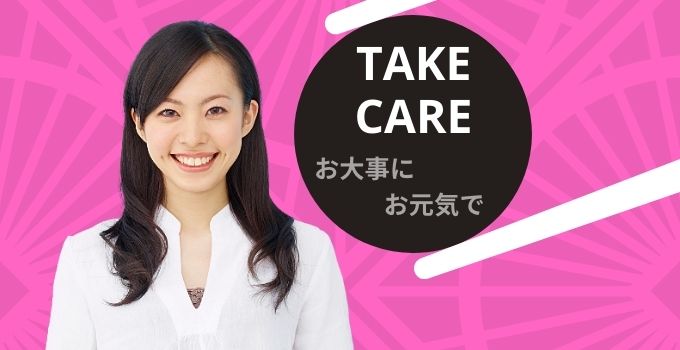English and Japanese don’t at all times match up, and it may be exhausting to discover the best means to translate a standard English phrase.
One instance is “take care.”
Table of Contents
How do you say “take care” in Japanese?
The commonest methods to say “take care” are お大事に (odaijini) and お元気で (ogenkide). Each these phrases specific a need that the particular person you might be talking to stays secure and in good well being, identical to the English phrase “take care.” Nevertheless, different phrases will be translated as “take care.” One is いってらっしゃい (itterasshai), generally mentioned to somebody leaving the house. 気を付けて will be translated as “take care” as effectively.
Caring for what’s essential with お大事に
The literal meaning of お大事に is “of essential issues.” 大事, which suggests essential, is preceded by お, which makes a phrase extra well mannered and formal.
You may discover this isn’t a whole sentence. The implied verb is often なさってください, the respectful type of the all-purpose verb する.
Though する and なさる mean “to do,” they will stand in for nearly any verb. On this case, the total sentence means one thing like “Care for what’s essential.”
Except you’re being very formal, although, there’s no want to say 「お大事になさってください。」 Individuals often simply say 「お大事に。」
This isn’t a phrase you’d say as an off-the-cuff goodbye.
Though it’s related to “take care,” it implies that the particular person is both sick or possible to be in another harmful scenario.
You too can use this phrase to say “get effectively quickly.”
Examples
「大学で病気になったと聞いていますがそれは本当ですか?」
「ええ、ばあちゃん。」
「まあ!お大事にね。」
“I heard you bought sick at college. Is that basically true?”
“Sure, Grandma.”
“My! You want to take care, okay?”
お大事に, translated right here as “take care,” is an injunction from the grandmother to her grandchild. It’s not a goodbye, however a reminder of what’s essential.
As a result of this isn’t a proper dialog, the grandmother didn’t add a verb. As an alternative, the particle ね is used to emphasize her level.
お元気で: Till subsequent time
Like お大事に, the phrase お元気で is concentrated on well being.
If something, this phrase is extra explicitly health-based. The kanji 元気 mean “wholesome,” so a literal translation of this phrase can be one thing like “be in good well being.”
That mentioned, お元気で is extra just like the English “take care” in that it’s used to say goodbye to somebody in a dialog. Not like the English phrase, nonetheless, お元気で means that will probably be some time till you meet once more.
Examples
「来週、沖縄に行く。」
「そうか?いつ帰るか?」
「さあな。一月かも。」
「あ、そう。長い間だよね。」
「ですね。」
「やばい!仕事に行かなきゃ。お元気で!」
“I’m going to Okinawa subsequent week.”
“Oh yeah? When are you coming again?”
“Dunno. Possibly January.”
“Wow. That’s a very long time.”
“Yeah.”
“Crap! I’ve to go to work. Take care!”
On this pattern dialog, one particular person is leaving city for some time. Though the second particular person has to finish the dialog abruptly, they accomplish that by saying お元気で as a means of displaying they want the opposite particular person effectively.
How to say “take care whilst you’re gone” in Japanese
As any pupil of Japanese can inform you, 行ってらっしゃい is usually taught as a inventory phrase to use when somebody leaves the house.
The phrase is made up of 行く, to go, and the command type of いらっしゃる, an honorific and sophisticated verb meaning one thing like “to come,” “to go” or “to be” relying on context.
“Go and are available again” sounds very unusual in English, although, so “take care” is a extra wise means to translate this inventory phrase.
Examples
「すぐ行かないと学校に遅刻するよ。」
「はい、行ってきます。」
「行ってらっしゃい!」
“For those who don’t depart quickly you’ll be late for varsity.”
“Okay, I’m heading out.”
“Take care!”
As a result of 行ってらっしゃい is a inventory phrase, it doesn’t want a lot clarification. Simply do not forget that it’s often solely used in a house setting.
Utilizing 気を付けて in Japanese
気を付けて, whereas it may additionally mean “take care,” often carries a suggestion that somebody wants to watch out of one thing particular.
You shouldn’t use this phrase to finish a dialog, however it may nonetheless typically present up as “take care” in English translations.
Examples
「黒いですから、うちに帰ると気をつけてね。」
“It’s darkish, so take care in your means residence.”
「道が狭いから、気を付けてね。」
“The street is slim, so take care.”
Clearly, these makes use of of “take care” wouldn’t make sense in any informal dialog. If there’s a selected factor you need to inform somebody to watch out for, nonetheless, 気を付けて is a helpful phrase.
Hey fellow !! It’s me, James. I’m the proud proprietor of uggscanadaugg.ca. Languages have at all times been my ardour and I’ve studied Linguistics, Computational Linguistics and Sinology on the College of USA. It’s my utmost pleasure to share with all of you guys what I find out about languages and linguistics in normal.




